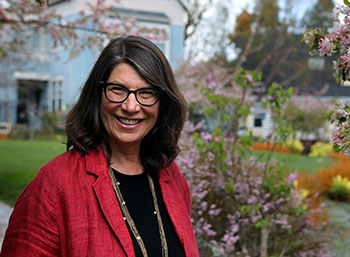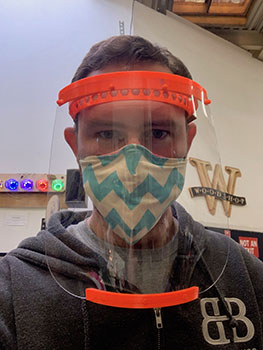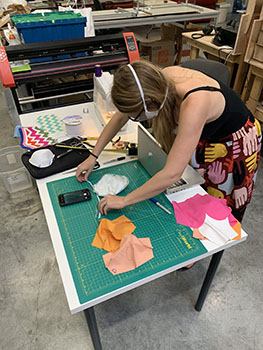Campus News
On a mission for masks
Catherine Sonquist Forest is on an urgent mission to crowdsource, manufacture, and deliver cloth masks to those who need them the most in Santa Cruz and Monterey counties during the COVID-19 crisis.



For many health care providers, cashiers, farm workers and health aides, “safe distance” is a luxury.
That’s why doctor and educator Catherine Sonquist Forest ( Rachel Carson, community studies and environmental studies, ’81) is on an urgent mission to crowdsource, manufacture, and deliver cloth masks to those who need them the most in Santa Cruz and Monterey counties during the COVID-19 crisis.
An attending physician in outpatient care and clinical associate professor of family medicine at Natividad Medical Center in Salinas, Forest has spent most of her life helping patients and advocating for better protections for health care workers.
Now she is a visionary and partner for Project PPE 4 Central Coast, a collaborative partnership with Idea Fab Labs, a Santa Cruz-based community hub that has high-tech fabrication tools including 3D printers and laser cutters for art making and small-scale manufacturing.
Forest, who is married to epidemiologist Will Forest, was ramping up efforts to make and distribute masks for weeks before the Centers For Disease Control called for members of the public to wear a mask “appropriate to the level of risk” outside the home in early April.
The instigating factor was the legions of doctors, nurses, and EMTs who are vulnerable to infection in their work saving lives. Without proper protections, “we are endangering three generations of health care workers,” Forest said.
While she called California Gov. Gavin Newsom’s shelter-at-home order the cornerstone of the state’s ability to mitigate the fight against COVID-19, Forest expressed concern about area residents who must still venture out, either for work or for essential appointments.
It is essential to “maintain your space and cover your face while sheltering in place” she said. “However, I know someone who is immunocompromised and must go out every day for a health appointment. That is not a safe situation.”
Forest is answering the need for masks by channeling a combination of Santa Cruz high-tech know how and the skills of a crafty sewing community. In the process, she is helping to put the fight against the spread of COVID-19 into local hands, she said. “It’s important to take initiative, instead of waiting for a trickle-down approach.”
With support from the nonprofit Encompass Community Services, where Forest serves as co-chair of the board of trustees, and in partnership with Santa Cruz and Monterey Medical Societies and the Central Coast Academy of Family Physicians, Project PPE 4 Central Coast has become a cloth-mask production hub. Idea Fab Labs makes cloth-based mask-making kits, which are then distributed to more than 30 quilters and sewists across the Central Coast.
Forest is looking to grow this hard-working group of independent contractors as much as possible. Donations, channeled through GoFundMe, have been subsidizing the cost of the mask materials and payment to the seamsters.
The cloth masks are inspired by the design of the N95 mask, a health-industry standard. They consist of four layers of cotton fabric, alternating grain and bias cut fabric, with moldable nose bridges, ensuring a snug fit around the nose and chin.
They also have stretch headbands, though a national shortage of elastic is posing a challenge. Because they can be washed or heated in ovens, the mask can be sterilized for re-use. The fabric also ensures that the masks can be mass-produced with material kits and DIY assembly.
Project PPE 4 Central Coast takes orders from non-profit organizations in need of the masks and is poised to coordinate a larger regional innovation effort. Although the project is not currently selling the masks to the general public, the template for the washable mask design is available for free download, along with DIY instructions and a step-by-step video demonstration. Forest said that the masks are easy to make for anyone with a sewing machine.
Forest emphasizes that these masks, while effective in preventing the transmission of droplets from the wearer to other people, are no substitute for genuine N95s – which also offer the wearer some protection from droplets from others. She emphasized that all certified N95s and surgical masks should be reserved for high risk jobs such as healthcare workers. The group has also innovated face shields, barriers for testing stations, and other PPE.
It is imperative that hospital personnel have first priority when it comes to N95 distribution, she said. “These are not N95s, and we are not making that claim,” Forest said. “But we are trying to do a better job in creating a mask design than just a bandanna, cloth wrapping, or 2-layer cloth surgical mask.”
Since plastics and medical materials are scarce these days, cloth masks provide an easily sourced alternative.
After the sewists finish the masks, project partners collect and distribute them to health care and residential workers, home health aides, and hospice workers, as well as local physicians and their staff who don’t work for hospitals that are part of large buyer groups that can vie for protective equipment.
It’s an ambitious project. Forest hopes to keep ramping up production until the seamsters are producing 3,000 or more masks per week. But a national health emergency requires innovation and bold approaches, she said.
Looking back, Forest can trace the roots of Project PPE 4 Central Coast to her college days.
“I developed a problem-solving ability, as well as my commitment to health equity and justice while at UC Santa Cruz,’’ Forest said. “That has been a thread through my whole career. I am grateful for that training. If this project makes even one speck of difference during the COVID-19 epidemic, it will have been worth it.”